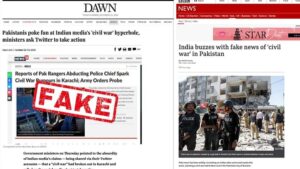by Zaheema Iqbal and Rafi Us Shan 22 April 2021
The convergence of digital and physical world has fundamentally changed the notion of security. An incident happens online may have far-reaching implications on the physical societies and may target the core fabric of the society. The digital campaigns against social sensitivities including discrimination, racial issues and religion or cultural disparities leave its footprints on the physical integration of communities at large. While technology brought opportunities, and empowered the marginalized with connectivity but has given rise to serious questions and uncertainties by exposing the uncontrollable shadows of cyber world over the physical society.
Pakistan has been the continuous target of serious disinformation campaigns over the years. The most significant disinformation revelation and fake news propaganda was the Indian Chronicles; 15 years focused and targeted campaign against Pakistan involving 750 fake media outlets and 550 domains across 119 countries across the world. These social media campaigns targeted the fragile sensitivities in the society and endeavored to depict the odd realities to the audience abroad thus led to affect the nation’s posture in cyber-physical domain. On top of that, the content management platforms such as Twitter, Instagram, and Facebook are contributing to this disinformation ecosystem. The limited content filtering capacity of these platforms and innovative techniques employed by the fake news generators provide a lucrative space to micro target those fragments of society that are vulnerable to these sensitivities.
In the recent years, the incidents of blasphemy has shaken the Muslim world, sentiments were hurt due to unprovoked statements, and gestures directed at most respected personalities in Islam. World need to realize that there are very thin lines in the Muslim society what is blasphemous in relation to Prophet (PBUH) and core principles of Islam. Anything targeting the noble personalities and principles of Islam on the name of freedom of expression in physical and cyber space is hurting the sentiments of Muslims. Using loosely regulated social media platforms to incite groups on blasphemy, promoting disinformation and fake news to incite group against other groups or nation states are some of the scary aspects of abuse of cyberspace. Pakistan has been continuous target of disinformation and fake news campaigns, recent blasphemy, and insensitive statements by individuals was diluted with disinformation and fake news to target the political party, individuals in ruling party and government of Pakistan. This orchestrated campaign was carried out to incite mistrust and hatred against the government and picture an alternate reality that civil war has broken out and state of Pakistan is involved in unlawful activities and high handedness against own citizen. These fifth generation warfare tactics fueled by fake news and fabricated infographics content undermines the trust of citizens on the state.
In this context, Prime Minister of Pakistan, Mr. Imran Khan has always been a staunch advocate and vocal of blasphemy issues and has shown his deep concern over religious hatred at 75th anniversary of United Nations. He clearly asked the international community to treat blasphemy towards the distinguished personalities of Islam as they treat Holocaust to the Jewish community. This is the state’s narrative on religious issues in the country. However, misinformation and disinformation undermine the great work state has been doing and try to picture them having soft views on blasphemy. This is the evidence how adversaries are targeting the vulnerable fragment of society.
The recent TLP protests in Pakistan has once again proven the fake news and targeted disinformation campaign by the adversaries. The hashtag #civilwarinpakistan has been tweeted mostly by people sitting in India and the percentage of indigenous content was very less. The hashtag was shared by 41,000 users, 53,000 users interacted, 375 times mentioned, received more than 11,000 likes and reach was 3.8M. Around 1600 accounts in this trend were created since Jan 2021 out of which 468 were made in April. There were 9200 accounts which took part in this campaign and majority were from India. It was also found that there is mix of Pakistani and Indian accounts. Pakistani accounts were either fake or being used by TLP to highlight the Indian narrative. Another interesting fake video which went viral was showing a LEA armored vehicle driving over the protestors. The video was massively tweeted by Indians to create disturbance in the Pakistan and more than 50,000 users viewed it worldwide.
Taking an excellent example of Christchurch call which was initiated in response to the terrorist against two mosques in New Zealand. The Call is actually a commitment by the New Zeeland government and technology companies to abolish terrorist and violent extremist content online. It ensured that though a free, open and secure internet offers significantly benefits to society, however, respect for freedom of expression is fundamental. No one is allowed to use cyber space for violent extremism.
Moving forward, Pakistan needs to realign the basic definitions of hate speech, misinformation and disinformation, and freedom of expression which are blurred according to the definitions provided by social media companies, platform provider and the nation state. Social media platforms have to ensure close content oversight and ensure to crack down on fake accounts, orchestrated campaigns against other states and societies inciting and exploiting violence, hate and difference of opinion on religious affairs. Pakistan and social media platforms need to be renegotiate the content filtering framework and ensure to revalidated in the context of recent conflicts. Because of fragility of social issues, Pakistan’s weak cyber security posture and lack of strategies in cyber domain that it has been treated as open target by its adversaries. State institutions should beef up their efforts to have a harmonized and synchronized strategies and policies to hate, discrimination and fake news in the cyber world.
Zaheema Iqbal is Senior Cyber Security Policy Researcher at National Institute of Maritime Affairs, Bahria University Islamabad, Pakistan. She can be reached at [email protected]
Rafi Us Shan is Cybersecurity researcher and He can be reached at [email protected]

